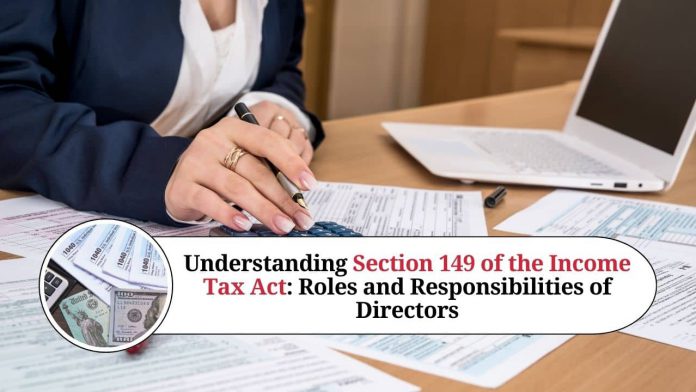Section 149 of the Income Tax Act is an important provision that outlines the roles and responsibilities of directors regarding income tax compliance. This provision applies to all types of companies and is essential for ensuring that directors understand their legal obligations when it comes to income tax compliance. In this article, we will discuss the key provisions of Section 149 and their significance for directors.
Overview of Section 149
Section 149 of the Income Tax Act states that every company must have at least one director who is a resident of India. Additionally, it requires all directors to ensure that the company complies with all the provisions of the Income Tax Act. The section further outlines the duties and responsibilities of directors regarding tax compliance.
Roles and Responsibilities of Directors: The roles and responsibilities of directors under Section 149 include the following:
- Ensuring timely filing of tax returns: Directors are responsible for ensuring that the company files its income tax returns on time. This includes the submission of various documents such as balance sheets, profit and loss statements, and tax audit reports.
- Payment of tax liabilities: Directors are responsible for ensuring that the company pays all its tax liabilities on time. This includes the payment of advance tax, self-assessment tax, and tax deducted at source (TDS).
- Compliance with tax laws: Directors must ensure that the company complies with all the provisions of the Income Tax Act. This includes the proper maintenance of books of accounts, timely deposit of TDS, and compliance with transfer pricing regulations.
- Verification of tax returns: Directors must verify that the information provided in the tax returns is accurate and complete. They must also ensure that all the necessary disclosures have been made in the tax returns.
Consequences of Non-Compliance
Non-compliance with Section 149 can result in severe consequences for directors. In case of non-compliance, the Income Tax Department can initiate legal proceedings against the company and its directors. This can lead to penalties, fines, and even imprisonment in extreme cases.
Conclusion:
Section 149 of the Income Tax Act is an essential provision that outlines the roles and responsibilities of directors in tax compliance. Directors need to understand their legal obligations under this section to ensure that the company remains compliant with the Income Tax Act. Failure to comply with Section 149 can result in severe consequences for directors, and therefore, they must take their responsibilities seriously.
Frequently Asked Questions
Q:1 What is Section 47 of the Income Tax Act?
A: Section 47 of the Income Tax Act provides for the transactions that are not considered as a transfer and hence, are not taxable under the Income Tax Act.
Q:2 What are the transactions covered under Section 47 of the Income Tax Act?
A: The transactions covered under Section 47 of the Income Tax Act include the transfer of shares in a company, transfer of a capital asset in a merger or demerger, transfer of shares or stock of a company under a scheme of amalgamation or demerger, and transfer of a capital asset in succession or inheritance.
Q:3 Are there any conditions for a transaction to qualify as a transfer under Section 47 of the Income Tax Act?
A: Yes, certain conditions need to be fulfilled for a transaction to qualify as a transfer under Section 47 of the Income Tax Act. These conditions include the transfer of the entire or part of a capital asset, the transfer must be made without any consideration or for inadequate consideration, and the transfer should be made by a specified entity.
Q:4 What is a specified entity under Section 47 of the Income Tax Act?
A: A specified entity includes a company, a firm, a Hindu undivided family (HUF), an association of persons (AOP), a body of individuals (BOI), a local authority, and any artificial juridical person.
Q:5 Can the transfer of shares between two companies be considered a transfer under Section 47 of the Income Tax Act?
A: No, the transfer of shares between two companies does not qualify as a transfer under Section 47 of the Income Tax Act if the transfer results in the acquisition of shares of the transferee company by the transferor company.
Q:6 Are there any tax implications for transactions covered under Section 47 of the Income Tax Act?
A: No, there are no tax implications for transactions covered under Section 47 of the Income Tax Act as they are not considered as a transfer and hence, are not taxable under the Income Tax Act.
Q:7 Can a transaction covered under Section 47 of the Income Tax Act be challenged by the Income Tax Department?
A: Yes, the Income Tax Department can challenge a transaction covered under Section 47 of the Income Tax Act if it believes that the transaction was not carried out in good faith or was done with the intent to evade tax.
Q:8 Is it necessary to disclose transactions covered under Section 47 of the Income Tax Act in the income tax return?
A: Yes, it is necessary to disclose transactions covered under Section 47 of the Income Tax Act in the income tax return as the details of such transactions may be required for audit and assessment purposes.




















